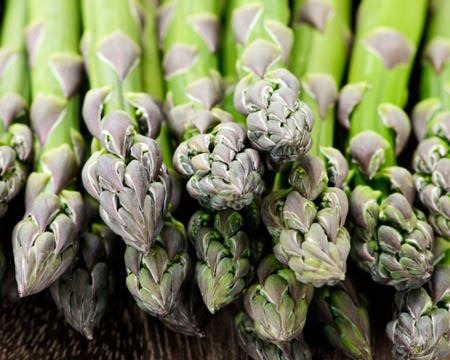Asparagus: Bigger Is Better
In case you haven't noticed, we're in full-scale asparagus season, and spears of all sizes, green and white and occasionally purple, are in markets everywhere.
Asparagus, a flowering perennial native to parts of Europe, North Africa, and western Asia, was eaten as long ago as around 18,000 B.C. in ancient Egypt, as both food and (for its diuretic powers) as medicine. The Greeks and the Romans were fond of it, and it was much appreciated in the Arab world. Its name derives from the Persian asparag, meaning sprout. The French considered it a gastronomic treasure (Louis XIV had it grown in greenhouses for the royal banqueting table), and it seems to have reached the United States around the time of the Civil War. In parts of New England, as in England beforehand, it was known as "sparrow-grass".
Today, California leads the country in the production of asparagus, as it does with so many fruits and vegetables, and the spears thrive in the state's agricultural heartland, the Central Valley. Mister Spear, the Stockton-based produce company started in 1978 by Chip Arnett, is far from being one of the largest producers of the vegetable, but it ships some of the very best. Mr. Spear's specialty is thick, or "jumbo", asparagus — not the pencil-thin, often fibrous ones that are most prevalent in our supermarkets today, but fat, tender spears three-quarters of an inch or so in diameter at the base. According to Arnett, the first thick shoots sent out by a mature asparagus plant each spring are the tastiest; as the season progresses, the plants tire and the diameter of the shoots shrinks, as their meat starts toughening. The difference is very noticeable: Jumbo asparagus is tender (even when it's not overcooked) and more flavorful than the other kind.
Mr. Spear asparagus is sold nationally through several large supermarket chains, including Whole Foods, but is also shipped direct to the consumer from the company in Stockton. Arnett suggests that his customers bathe their asparagus in ice water for 30 minutes, then drain and dry it and refrigerate it wrapped in damp paper towels in a cloth vegetable bag. The stalky ends of the asparagus should trimmed or at least peeled before cooking, and the cooking shouldn't go on too long (the Roman emperor Augustus used the expression "faster than cooking asparagus" for something done quickly). Asparagus can be added to various dishes or elaborately sauced — a simple sauce hollandaise is always nice — but to me some nice plump sparrow-grass from Mr. Spear, cooked just long enough, drizzled with melted butter (with maybe a few drops of lemon juice), and sprinkled with coarse salt is pure heaven.
